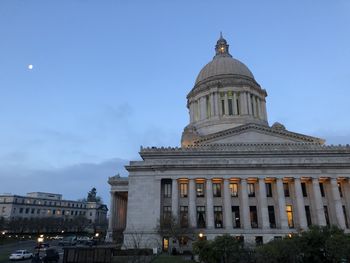This Week in Olympia

Week of March 9
The 2020 legislative session has come to a close, and in this otherwise trying and uncertain time, there is some good news coming out of Olympia for our students and educators, on both the education budget and policy fronts.
We know that WEA members are the strongest advocates in the state for making sure all PK-12 and higher education students have access to a quality public education. Because of the actions by many of us, we made significant progress toward our 2020 legislative priorities.
- Promote equity and combat racism
- Ensure safe schools and campuses
- Recruit and retain quality staff
- Improve learning conditions
- Build stronger relationships with students and families
Hundreds of WEA members participated in this year’s Lobby Day at the beginning of the session on Martin Luther King, Jr. Day. Many more lobbied in Olympia throughout the session. Thousands of us sent emails and/or made phone calls to lawmakers to support legislation. Several WEA members testified in committee hearings to support good bills.
Highlights from the final budget include:
- $32 million to add a ½ FTE counselor in high poverty elementary schools. That equates to more than 300 FTE counselors for our students who need the most help.
- $3 million for student mental health and safety primarily for ESD-based administrative supports.
- $14 million for paraeducator training, adding two additional days, bringing the total to four funded days.
- $46 million for local levy assistance, ensuring that payments to districts are maintained at 2019 levels, less any new local revenue provided in calendar year 2020.
- And $41 million in student transportation costs.
- The COLA for Plan 1 retirees passed, meaning Plan 1 retirees will see an increase in their pension checks up to a maximum of $62.50 per month, effective in July.
- K-12 pay. The inflation adjustment went down from last year’s estimate of 2.1% to 1.6% for certificated and classified staff for the 2020-21 school year.
The legislature also provided $200 million in emergency funds to support the COVID-19 response in our state. Most of those funds will go to public health agencies. A last-minute amendment allows the State Board of Education flexibility for altering or waiving graduation requirements during this period.
In regards to COVID-19, WEA is supporting members by providing bargaining and technical assistance to local unions. If you need assistance, please contact your local president or staff. WEA is updating its website as needed. Some policy bills, listed under “Safety” below, also address SEBB and shared leave during the outbreak.
In addition to those larger ticket items, WEA advocated for budget provisos to promote equity and combat racism.
- Office of Equity and Inclusion – This new office, serving the Governor, will work with the state Education Ombuds and OSPI to develop a plan to promote skills, knowledge, and awareness concerning issues of diversity, equity, and inclusion among families with school-age children.
- WaKIDs bias review – Requires the Educational Opportunity Gap Oversight and Accountability Committee (EOGOAC) to review the WAKIDS assessment, materials, tools, and related professional development for bias, and then issue a report to OSPI and the legislature identifying opportunities for reducing bias and barriers to implementation.
- African American history – Provides funding to convene a workgroup to develop recommendations for integrating African American history, examinations of racism, and the history of the civil rights movement into curriculum for grades 7-12.
- Professional learning for all school employees – Directs school districts to train staff on racial literacy, cultural responsiveness and stereotype threat for purposes of closing persistent opportunity gaps.
- Since time immemorial tribal sovereignty – Proposes additional funding for professional learning and technical assistance to support the ongoing implementation of this curriculum.
- Racial discipline gaps – Provides new grants to school districts to create systems, policies, and practices to address racial discipline gaps.
WEA also successfully secured funding related to higher education for a pilot project to investigate housing for CTC faculty and staff at four colleges. The budget includes funding for CTC’s to plan how to increase the ratio of full-time tenure-track faculty to adjunct faculty and how to help our adjunct faculty achieve pay equity with full-time colleagues. CTCs are directed in the budget to report additional financial transparency data to the Governor’s Education Research and Data Center for public posting online.
Policy bills that passed include:
Promote equity and combat racism
HB 2551 Would permit students to wear traditional tribal regalia and objects of cultural significance at graduation ceremonies and related events.
HB 2602 Concerning hair discrimination, would prohibit discrimination because people have afros, braids, locks or twists.
HB 2711 Would address equitable educational outcomes for foster care and homeless children.
SB 6066 Would expand ethnic studies materials and resources for K – 6 grades.
Safety for students and staff
HB 1888 Would limit access to employee photos, phone numbers and payroll deduction information. Only media outlets would have access to birth dates just as they do with law enforcement and criminal justice employees.
SB 5395 is the comprehensive sexual health education bill.
ESSB 6189 (SEBB Eligibility) started the session in a form that we opposed, because it proposed eliminating SEBB eligibility for substitutes. We have worked with legislators throughout the session to change this bill to a version that we could live with, which turned into a study on SEBB. Language promoted by WEA guarantees that any employee with SEBB eligibility at the beginning of the COVID-19 outbreak (Feb. 29, 2020) will retain their eligibility for benefits even during school closures or changes in school operations related to the virus.
HB 2739 Allows employees to take shared leave on an intermittent basis instead of being required to take full-time leave. Also allows shared leave for employees if they or a family member are quarantined or in isolation related to health care directives during the COVID-19 state of emergency.
Recruiting and retaining quality staff
HB 2458 Would allow districts to offer optional benefits if they are not offered as part of the School Employee Benefit Board program. The bill clearly states that districts have authority to continue VEBA plans and other benefits such as cancer care and financial protection plans through payroll deduction.
Improving learning conditions
SB 6141 Would make financial aid packages and processes easier to understand.
HB 2660 Would expand school meals for students in 15 schools through the USDA’s Community Eligibility Provision and will feed 7,000 more public school students in our state.
HB 2116 Would establish a joint-select legislative task force on improving institutional education programs and outcomes. This task force will make recommendations about funding and educational improvements for students who are incarcerated in county or state facilities.


